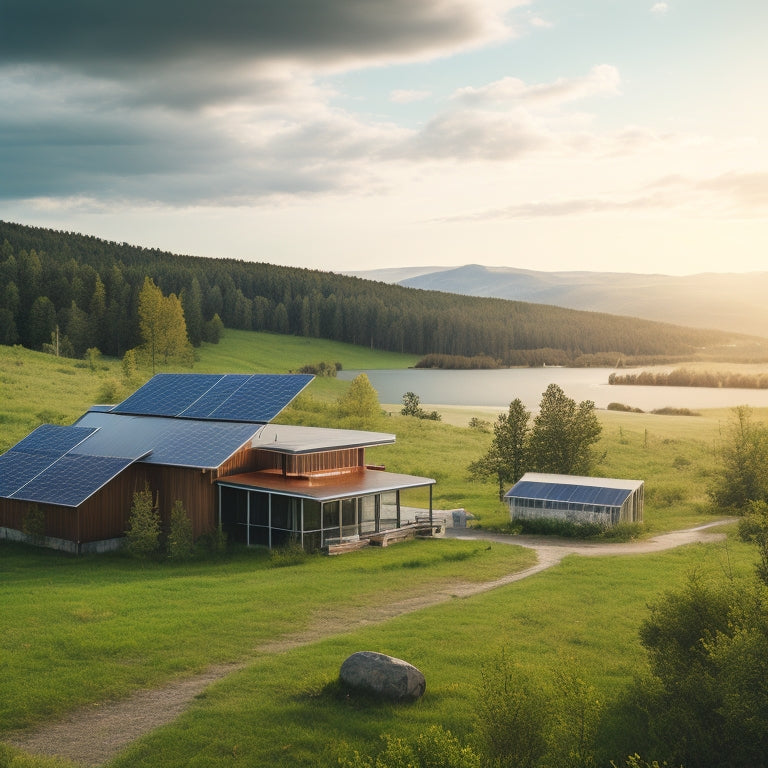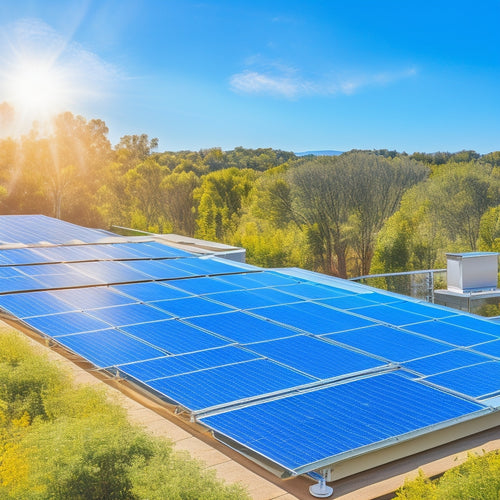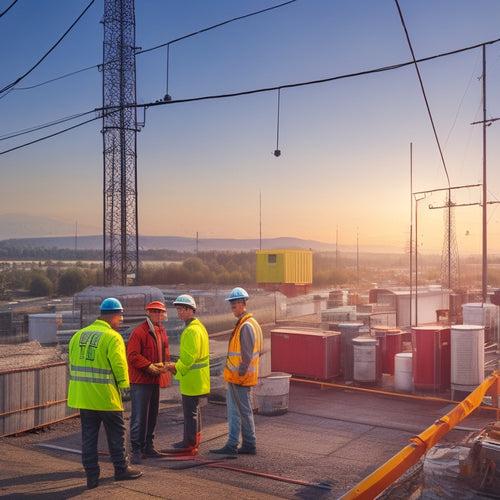
Off Grid Power Systems
Share
You're looking to break free from traditional energy providers and reduce your environmental impact with off-grid power systems. Off-grid living gives you control over your energy needs, utilizing renewable sources like solar, wind, and hydro power for a consistent energy supply. You can reduce your energy bills by shifting to renewable systems, which not only save you money but also promote a healthier planet. To guarantee a seamless shift, you'll need to assess your energy demands, calculate your daily loads, and consider inverter technology for power quality. As you investigate off-grid power systems, you'll uncover more ways to optimize your energy independence.
The Essentials
- Off-grid power systems provide energy independence through renewable sources like solar, wind, and hydro power, ensuring a consistent energy supply.
- Renewable energy sources like solar, wind, and hydroelectric systems offer cost savings, reducing reliance on traditional energy providers and energy bills.
- Off-grid systems promote eco-friendly living, reducing carbon footprint and supporting a sustainable future with lower energy expenses.
- Inverters play a crucial role in off-grid systems, synchronizing power output with grid waveform for efficiency and ensuring clean and stable AC output.
- Assessing energy demands and calculating daily loads is essential for designing an efficient off-grid system, ensuring reliable energy supply and minimizing energy losses.
Energy Independence Guaranteed Always
You're turning to off-grid power systems for one reason: energy independence.
With renewable energy sources like solar, wind, and hydro power, you're no longer reliant on the grid. By utilizing these natural resources, you'll enjoy power grid freedom, ensuring your energy needs are always met.
Furthermore, an off-grid solar system can help solve problems like frequent power outages and rising electricity bills, allowing you to reduce your energy expenses and live a more sustainable lifestyle.
Renewable Energy Sources
With the goal of energy independence always in mind, renewable energy sources take center stage in off-grid power systems.
You'll want to reflect on solar panel efficiency, which has increased considerably in recent years, making solar a more viable option. Wind turbine technology has also advanced, allowing for more efficient energy production. Geothermal energy potential is another option, particularly in regions with suitable geological conditions.
Hydroelectric power systems can provide reliable energy, especially in areas with abundant water resources. Biomass energy sources, such as agricultural waste and wood chips, can be converted into electricity and heat.
Many individuals struggle with the complexity and uncertainty of designing and installing a reliable off-grid solar system that meets their unique energy needs. To guarantee a stable energy supply, you'll need energy storage solutions, like batteries or fuel cells.
Microgrid development is essential for integrating these sources into a reliable and efficient system. Energy policy impacts and renewable energy incentives can affect the feasibility of your off-grid project.
Power Grid Freedom
Achieving power grid freedom is the ultimate goal of off-grid power systems, guaranteeing energy independence at all times. You're not reliant on the grid, and you're in control of your energy needs.
With off-grid living, you can enjoy a sustainable lifestyle, free from the constraints of traditional energy sources. By integrating renewable energy sources, such as solar panels and wind turbines, you can generate your own power and store it in a solar battery or other energy storage solutions.
By embracing DIY off-grid solar systems Renewable Energy Solutions, you can reduce your reliance on expensive generators or grid connection, and minimize your carbon footprint. This level of self-sufficiency allows you to break free from the grid, reducing your reliance on non-renewable energy sources.
You'll enjoy energy resilience, knowing that you're prepared for any power outage or grid failure. With grid alternatives, you can live off the land, using eco-friendly solutions to power your home.
Off-grid power systems provide the perfect opportunity to adopt a sustainable lifestyle, reducing your carbon footprint and living in harmony with the environment. By embracing renewable integration, you'll be well on your way to achieving power grid freedom, securing your energy independence for years to come.
Renewable Energy Cost Savings
You can expect significant savings on your energy bills when you shift to a renewable energy system, as it reduces your reliance on the grid and decreases your energy expenditure.
With residential solar power systems, you can generate renewable energy and save on electricity bills with efficient and durable house solar panels solar panel installation.
By utilizing natural resources like solar or wind power, you'll reduce your carbon footprint, contributing to a cleaner environment.
With a well-designed off-grid power system, you'll enjoy lower energy bills and a reduced carbon footprint, achieving a more sustainable lifestyle.
Lower Energy Bills
Renewable energy systems, such as solar and wind power, offer a reliable way to reduce your energy bills. By utilizing natural resources, you can greatly lower your reliance on traditional energy sources and decrease your energy expenses.
A cost analysis of your current energy usage can help you identify areas for improvement and determine the most effective renewable energy solution for your needs.
Investing in energy efficiency measures, such as upgrading to energy-efficient appliances and insulation, can also contribute to reduced energy bills. When combined with renewable energy systems, these measures can lead to considerable cost savings.
For instance, a solar panel system can save you up to 50% on your energy bills, depending on your location and energy usage. By taking control of your energy production, you can enjoy lower energy bills and greater energy independence.
With a well-designed off-grid power system, you can break free from the constraints of traditional energy providers and enjoy the freedom to live life on your own terms.
Reduced Carbon Footprint
As fossil fuels continue to deplete and environmental concerns escalate, reducing your carbon footprint has become a pressing matter. By switching to off-grid power systems, you can markedly decrease your reliance on non-renewable energy sources. This shift towards sustainable living not only benefits the environment but also provides you with a sense of autonomy and independence.
Off-grid power systems, such as solar and wind energy, offer a cleaner alternative to traditional fossil fuels. By utilizing renewable energy, you can reduce your carbon footprint and contribute to a healthier planet.
Implementing eco-friendly practices, like energy-efficient appliances and smart grids, can further minimize your impact on the environment.
With off-grid power systems, you can enjoy the freedom to live life on your own terms, untethered from the grid. By reducing your carbon footprint, you're not only doing your part for the environment but also investing in a sustainable future.
Make the switch to off-grid power systems and commence on a voyage towards a cleaner, greener tomorrow.
Inverter Synchronizes Power Output
When you design an off-grid power system, you need to guarantee that the inverter synchronizes its power output with the grid's waveform. This is especially vital for remote cabins that rely on off-grid energy independence and renewable energy systems.
This requires precise power phase alignment, where the inverter's output voltage waveform is matched with the grid's waveform to prevent distortion and guarantee efficient energy transfer. Additionally, the inverter must regulate its output voltage to match the grid's voltage, ensuring a stable and reliable power supply.
Power Phase Alignment
In an off-grid power system, the inverter's primary function is to convert DC power from the energy source into AC power for your home or business. When you're relying on an off-grid power system, power quality is vital. You need a stable and consistent AC output that matches the grid's frequency and voltage.
To accomplish this, your inverter must synchronize its power output with the grid's waveform. This process is called power phase alignment. The inverter guarantees its AC output is in phase with the grid's AC waveform, minimizing any phase shift between the two. A phase shift can lead to poor power quality, damage to appliances, and even safety hazards.
By aligning the power phases, you get a clean and stable AC output that's identical to the grid's power. In an off-grid power system, the inverter's ability to synchronize its power output with the grid's waveform is essential. This guarantees you get high-quality power that's reliable and safe for your home or business.
Output Voltage Regulation
Your off-grid power system's inverter synchronizes its power output by regulating the output voltage to match the grid's voltage. This guarantees voltage stability, which is critical for safe and efficient energy transmission.
The inverter's flexible regulation capabilities allow it to adjust the output voltage in real-time, compensating for fluctuations in the grid's voltage. This precise control enables your off-grid system to seamlessly integrate with the grid, providing a reliable and consistent power supply.
The inverter's voltage regulation capabilities are particularly important when you're generating power from renewable sources like solar or wind. These sources can be prone to output fluctuations, which can affect the overall system's stability.
Assess Your Energy Demands
You need to understand your energy usage patterns to design an effective off-grid power system.
When planning your off-grid camping expedition, consider the importance of portable power solutions that can keep your devices charged.
To do this, you'll want to calculate your daily loads, including the wattage and duration of each appliance's use.
Energy Usage Patterns
Energy usage patterns vary greatly depending on the specific needs and habits of individuals and households, making it essential to accurately assess energy demands before designing an off-grid power system.
Your energy usage pattern is unique, influenced by factors like the number of people in your household, your lifestyle, and the appliances you use.
To understand your energy usage pattern, you'll need to monitor your energy consumption. This involves tracking your energy usage over a period, typically a month, to identify patterns and trends.
You can use energy monitoring tools, such as smart plugs or whole-house energy monitors, to collect data on your energy usage. This data will help you identify areas where you can optimize your energy usage.
Calculate Daily Loads
Calculating daily loads is an essential step in evaluating energy demands, as it helps determine the total amount of power required to support various appliances and devices in an off-grid system. This process involves load estimation, which is critical in ensuring you have a reliable and efficient energy supply.
To calculate your daily loads, you'll need to identify the appliances and devices you plan to power, their respective wattage ratings, and the number of hours they'll operate daily.
Start by making a list of all your appliances and devices, including lights, refrigerators, computers, and televisions. Next, determine their individual power consumption in watts. You can find this information on the device's nameplate or in the user manual.
Multiply the wattage rating by the number of hours you expect to use each device daily to get the total watt-hours (Wh) per day. Add up the total Wh per day for all devices to get your total daily load.
Higher Surge Capacity Guaranteed
You need an off-grid power system that can handle peak power demands, especially during startup when motors and compressors require higher current.
This is where higher surge capacity comes into play, ensuring your system can supply the necessary power without faltering.
Peak Power Handling
How do your off-grid power systems respond when sudden, high-power loads are applied? Can they handle the surge without compromising their performance or lifespan?
Peak power handling is a vital aspect of off-grid power systems, especially when you're relying on them for your daily needs.
To guarantee your system can handle peak power demands, you need to implement peak efficiency strategies. This involves optimizing your system's design and configuration to minimize energy losses and maximize power output.
Load management techniques also play an essential role in peak power handling. By prioritizing loads and managing their energy consumption, you can prevent power spikes that can overload your system.
A well-designed off-grid power system should be able to handle sudden surges in power demand without compromising its performance. This requires careful selection of components, such as inverters and charge controllers, that can handle high-power loads.
Frequently Asked Questions
Can I Use My Existing Electrical Panel With an Off-Grid System?
You'll likely need to upgrade your existing electrical panel to guarantee electrical compatibility with an off-grid system, as it may not be designed to handle the unique demands of renewable energy sources and energy storage systems.
How Do I Maintain and Troubleshoot My Off-Grid Power System?
You regularly inspect and test your system, anticipating potential issues, to guarantee seamless performance; prioritize battery maintenance, and plan for system upgrades to future-proof your setup, assuring uninterrupted power and independence.
Can I Add More Solar Panels to My System Later?
You can indeed expand your energy harvesting capabilities by adding more solar panels later, but first, assess your energy storage capacity to guarantee it can handle the increased power output, avoiding system overload.
Do Off-Grid Systems Work During Power Outages or Blackouts?
When the grid fails, you're not left in the dark; you'll maintain power reliability and energy independence since your off-grid system operates independently, ensuring uninterrupted electricity supply during power outages or blackouts.
Can I Use an Off-Grid System for My Entire House or Just Part of It?
Imagine living life on your own terms! You can choose to power your entire abode or just a few rooms with an off-grid system, depending on your energy needs, system efficiency, and budget; full home systems offer total freedom, while partial systems provide flexibility, but consider cost, installation, battery storage, and inverter options.
Final Thoughts
With your off-grid power system, you'll be shielded from the whims of the grid, enjoying "freedom from the tether" of utility companies. By utilizing renewable energy, you'll reap long-term cost savings, and the inverter will guarantee a seamless power supply. By precisely evaluating your energy demands, you'll get a system customized to your needs, with a higher surge capacity to boot. This means you'll be "basking in the glow" of energy independence, always.
Related Posts
-

What Types of Solar Energy Devices Are Available
You'll find several types of solar energy devices available today, each customized to different energy needs. Photovo...
-

Why Outdoor Solar Lighting Systems Are Sustainable
Outdoor solar lighting systems are sustainable because they utilize renewable energy, drastically reducing your carbo...
-

Smart Grid Technology Implementation Challenges
You'll encounter several challenges when implementing smart grid technology, particularly in cost management, scalabi...


